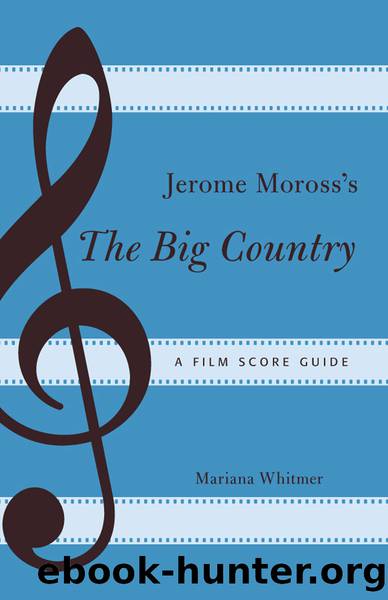Jerome Moross's The Big Country by Whitmer Mariana;

Author:Whitmer, Mariana;
Language: eng
Format: epub
ISBN: 9780810885011
Publisher: Scarecrow Press
1956: Jubal
Although Jubal did not attract many reviews, the attention it received was largely positive. In his review for the Los Angeles Times, Philip Scheuer skirts around his assessment of the film, yet credits the director, Delmar Daves, as being âone of the ablest exponents of western Americana extant.â Scheuerâs description of the plot elements, âsex, a tragic triangle, a mood of impending violence and a certain Greek inevitability,â outlines a very melodramatic film, closer to film noir than a Western.15 With few skirmishes and no Indians, Jubal features lots of interpersonal conflicts and sex. As described by one Western scholar, the plot could fit any number of Westerns from the mid-1950s, âa hero, in flight from his past, enters a community bringing his own demons with him and triggers an eruption of desire and violence.â16 It is the story of a drifter, the oddly named Jubal Troop (Glenn Ford), who is found unconscious on a mountain road by Shep Horgan, a successful rancher (Ernest Borgnine). Horgan offers Jubal a job and eventually accepts him as the adoptive son, which displeases the current heir apparent, Pinky (Rod Steiger). Horganâs wife, Mae (Valerie French) is attracted to Jubal, who consistently shuns her advances. Pinky takes advantage of circumstances and goads Horgan into believing that Jubal and Mae have consummated a relationship, resulting in a confrontation that leads to Jubal killing Horgan in self-defense. As a posse searches for Jubal, who has hidden away with a group of religious nomads (including Naomi, a more serious and chaste love interest), Pinky rapes and beats Mae. Before dying as a result of her injuries, Mae names Pinky as the guilty person, thus clearing Jubal of all wrong-doing, and allowing Jubal to ride off with Naomi.
David Raksin, who composed the score for Jubal, draws on his many years of experience as a film composer and particularly allows his experience in film noir to influence his approach. Perhaps most widely recognized for his score for Laura (1944), Raksin began his studio career quite early in the sound era, initially working with Charlie Chaplin on Modern Times (1936). Although Raksin scored in all genres, the list includes relatively few Westerns, specifically Across the Wide Missouri (Wellman, 1951) and Apache (Aldrich, 1954).
In the music for Jubal Raksin maintains a keen sensitivity to the human drama with few of the stereotypes associated with Westerns. Although he uses recurring melodies to provide thematic unity, Raksin generally allows the action on the screen to dominate what we hear. In keeping with the concept of the âsound effectsâ score, there is a great deal of visual mimicry provided by the music. Raksin occasionally uses guitar and a solo diegetic fiddle to instill a sense of Western essence to the score, but maintains a lush romantic instrumentation, primarily strings and French horns. The harmonic motion, particularly instances of colorful dissonance, guides the audience through the many tense moments in this film, as Raksin emphasizes the drama above all.
In Jubal there are two melodic motives that are frequently heard, in support of the narrative.
Download
This site does not store any files on its server. We only index and link to content provided by other sites. Please contact the content providers to delete copyright contents if any and email us, we'll remove relevant links or contents immediately.
| Actors & Entertainers | Artists, Architects & Photographers |
| Authors | Composers & Musicians |
| Dancers | Movie Directors |
| Television Performers | Theatre |
Cecilia; Or, Memoirs of an Heiress — Volume 3 by Fanny Burney(30949)
Cecilia; Or, Memoirs of an Heiress — Volume 2 by Fanny Burney(30907)
Fanny Burney by Claire Harman(25792)
We're Going to Need More Wine by Gabrielle Union(18086)
Plagued by Fire by Paul Hendrickson(16645)
Cat's cradle by Kurt Vonnegut(13896)
Bombshells: Glamour Girls of a Lifetime by Sullivan Steve(13119)
All the Missing Girls by Megan Miranda(12775)
Leonardo da Vinci by Walter Isaacson(11919)
4 3 2 1: A Novel by Paul Auster(11075)
Adultolescence by Gabbie Hanna(8154)
The remains of the day by Kazuo Ishiguro(7577)
Note to Self by Connor Franta(7030)
Diary of a Player by Brad Paisley(6871)
Giovanni's Room by James Baldwin(5896)
What Does This Button Do? by Bruce Dickinson(5535)
Recovery by Russell Brand(4573)
Born a Crime by Trevor Noah(4520)
The Kite Runner by Khaled Hosseini(4473)
